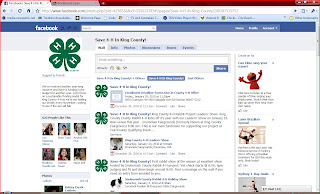I look at King County 4-H and see a “well-connected”
community of loving parents, passionate volunteers and Leaders, civically minded
and engaged youth. However, I see little
action until the final moment when all hope may be lost on one County Council
Vote! I am perplexed by this overall
unwillingness to really speak with one another about the issues at hand and how
to not only try to thwart it for the coming year but long-term too? The lack of foresight for an organization
that is all about growing, leadership, learning, civic engagement and community
is beyond me. That is why I wanted to
get involved, to begin some sort of open forum utilizing current technology
which hundreds of parents and volunteers are already connected to in order to
facilitate conversations and action!
Instead fear was shown, overwhelming fear that the internet and
technology can create more harm than good!
Well, I have to say that I don’t disagree completely, but I certainly do
not agree. Because of time constraints
it’s the groups best bet in organizing collective action, whether it be a
letter writing campaign, a protest (see image from newspaper clipping below) or
a video diary of current 4-H’ers experiences to share with new members, new
community members, to create new networking opportunities and to build support
for what seems to be a dying organization.
On a positive note, the following was shared with me via
email by the King County 4-H Adminstrator I have been working with as a gate
keeper. Some of the information is
troubling and needs to be addressed as far as youth participation is concerned
because it directly reflects what many Council members may be thinking or
feeling when it comes time to vote on the funding initiative for 2011 this
coming October/November:
“At this
time I have been working with clubs and the King County 4-H Association
on being more visable. I have to amit I have been busy with risk management like getting every one to turn in their paperwork so I can background screen everyone. We also lost 100 4-H member this year wether we would have 4-H. We also gained 167 new member."
on being more visable. I have to amit I have been busy with risk management like getting every one to turn in their paperwork so I can background screen everyone. We also lost 100 4-H member this year wether we would have 4-H. We also gained 167 new member."
"There is elements of 4-H that has not been
encourage by the leaders like Public Presentations and record books. In
Pierce County they have over 200 members doing county presentations while in
King county I have had 10 members. There is a lot of work that need to be done
in King County. "
We will know more about were King County stand when the King County proposed budget is released next month.” (Email correspondence from May 12, 2010).
This is the state of King County 4-H—a “wait and see”
mentality. I’ve joined the bandwagon out
of respect. However, by the end of June,
my planning process may change considerably to become more proactive and to
perhaps reach out to the greater community of leaders and volunteers on the web
as a “concerned citizen” rather than a CD Practicioner or Planner. Through strategic questioning and concerns, I
hope to get to a point where all King County 4-H community members have a sense
of “faith in themselves to tackle whatever issues come along” (Wolff 2001). I only hope to assist with the “visioning
process” (Wolff 2001). I remember at the
very beginning of this semester reading through the AMESH), and having one
particular bit strike me; a small question to ask the community members, “What
story do you want your grandchildren to tell about their home? How would you
like your community to look in twenty years?” (Waltner-Toews et al. 2004).
These are the questions I want to pose to the 4-H Community, these are the things
I’ve asked myself, and I know that I want to be able to share 4-H with my grandchildren or at least
tell them stories of how ‘we fought like hell’ to save it.
Wolff, T. (2001). A
practioners’ guide to successful coalitions. American Journal of Community
Psychology, 29(2), 173-191.
Waltner-Toews, D., Kay, J., Murray, T.P., and Neudoerffer, C. (2004). Adaptive methodology for Ecosystem Sustainability and Health (AMESH): An Introduction. In G. Midgley and A Ochoa-Arias (Eds). Community operational research: OR and systems thinking for community development (pp. 317-349). New York: Kluwer Academic.









Hi Alex,
ReplyDeleteInteresting and impressive. Thanks for your sharing. Keep going.
Good lucks,
Hung